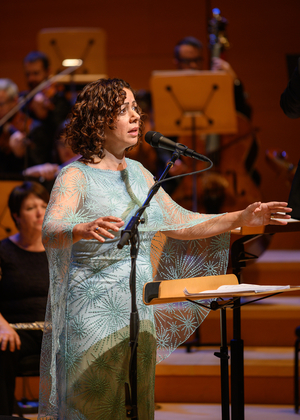
Grant Gershon likes to explore new territory with his Los Angeles Master Chorale — and his loyal audience follows right along with them. This can lead to some strange juxtapositions of material — few stranger than the pairing of Anton Bruckner’s mighty Mass No. 3 in F Minor and Osvaldo Golijov’s polystyled Oceana at Walt Disney Concert Hall Sunday night (Oct. 20).
What do these guys have in common? Almost nothing, although both composers have deep religious convictions coming from rather different sources. No matter, for the main point was that the Master Chorale had the enterprise to tackle two major works that these skilled singers and players had never performed before. Indeed, Gershon expressed some surprise that the Bruckner Mass — the biggest and most dramatic of the composer’s three settings of the Roman Catholic text — had not been done at Disney Hall, not even during the years when Zubin Mehta, a bonafide Bruckner man, was at the LA Phil. Nevertheless, both works came off splendidly.

The hour-long Bruckner Mass No. 3 dates from 1868, predating the Symphonies Nos. 2 through 9, and the inimitable stylistic signatures of Bruckner in full flight are few and far between. Nor do we sense the cosmic visions of the later symphonies and the choral Te Deum that transcend religion. Yet there are those moments that make the hair stand on end — like the exultant coda of the Gloria that has nearly the impact of its equivalent in Beethoven’s Missa solemnis. Or the stirring, thoroughly Brucknerian rapid repetitions that underscore the section in the Credo that begins, “On the third day, He rose again.”
Gershon made a good stab at exploring the subtleties of phrasing in the orchestral accompaniment, and the Master Chorale responded with its customary vigor. The solo vocal quartet (sopranos Elissa Johnston and Julia Metzler, tenor Joseph Lopez, baritone Derrell Acon) sang well, sometimes fighting to be heard over the massive choral/orchestral forces.

A decade ago, Golijov was one of the hottest contemporary composers on the scene, celebrated for his fusions of Latin American and world music elements with conventional classical trappings. He was especially lauded for his La Pasión según San Marcos, although a few spoilsports noted that successful Afro-Cuban/classical fusions had been done by Chico O’Farrill 50 years before. But accusations of plagiarism — however authorized, he claimed, by the plagiarized composer Michael Ward-Bergeman — and a more troubling string of missed deadlines have since sent Golijov’s reputation into eclipse from which he has yet to emerge. (Encouragingly, Golijov does have a new piece ready, a song cycle Falling Out of Time, for the Silkroad Ensemble, which is set to receive its world premiere at the College of the Holy Cross in Worcester, MA, on Halloween.)

In the meantime, Gershon revived the 1996 cantata Oceana, which reminded us of the initial promise of Golijov’s unite-the-world musical vision. The piece sets Pablo Neruda’s poem of the same name into a structure based on J.S. Bach’s cantatas, with the chorus and orchestra alternating with a solo voice backed by two guitars, two flutes, piccolo, and occasional Brazilian percussion. Gershon was especially fortunate to have on hand the endlessly versatile Brazilian vocalist Luciana Souza — who sang the world premiere at the Oregon Bach Festival and on the Deutsche Grammophon recording — her amplified voice scatting and soaring while nailing the Brazilian jazz feeling of the syncopated line. The guitarists were Scott Tennant of the Los Angeles Guitar Quartet (also on the recording) and Brian Head, who also fell in comfortably with the grooves.
For me, the outbreaks of groove are the most vital portions of the piece, and percussion instruments are seductively used to simulate the undulating sounds of water. In the end, as in a Bach cantata, the chorus had the last word(s) — and they were given the longest segment of the piece a cappella, concluding in a floating, near-meditative state that seems to fade ever so gradually. Which was a fitting way to send us floating into the night.




